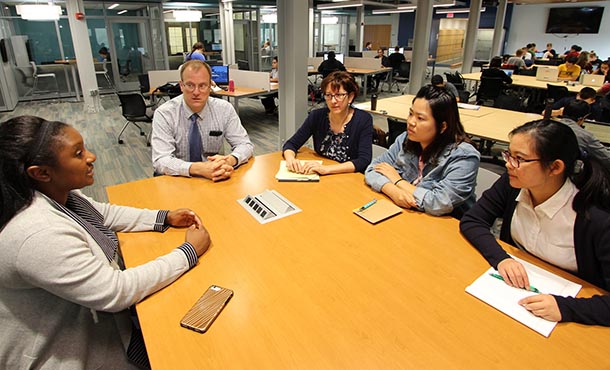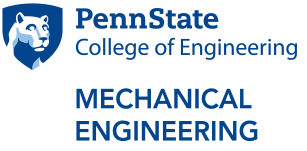
Diandra Prescod (left), assistant professor of counselor education, and Eric Marsh (second-from-left), Glenn Professor of Engineering Education, have created a new partnership that provides STEM-focused career counseling for undergraduate students.
New partnership brings together career counseling and engineering students
September 21, 2017
UNIVERSITY PARK, Pa. – When Diandra Prescod began researching the effects of career development programs on student retention in science, technology, engineering and mathematics (STEM) majors nearly five years ago, she was amazed at what she found.
“My research shows that students who participate in a STEM-focused career planning course are more likely to stay in their major,” Prescod said.
These results are huge, she said, because the United States is currently in a STEM crisis, with millions of STEM-related jobs remaining vacant each year.
Prescod, assistant professor of counselor education at Penn State, said about 50 percent of college freshmen enrolled in a STEM major change their course of study after the first year. Of those who do graduate with a STEM degree, only 25 percent of females and 45 percent of males actually go on to work in a STEM field.
“We are in a real STEM crisis,” she said. “For many reasons, students aren’t sticking with their major and not pursuing careers that are STEM-related.”
When Eric Marsh, Glenn Professor of Engineering Education in the Department of Mechanical and Nuclear Engineering (MNE), heard about Prescod’s research, he had an idea – what if students in his department received career counseling?
“Our students need guidance and support beyond what is offered in the traditional engineering curriculum to help find a career that best matches their unique strengths and talents,” Marsh said. “Diandra’s work in career development interventions for STEM students is a perfect fit for our goal to better support our undergraduate students.”
During the last few weeks of summer, Prescod, who also is the coordinator of the career counseling graduate program, and Marsh worked together to outline how their two programs could work together to best help their students. At the start of the fall semester, the new partnership was officially formed.
“My students who are working on their master’s degrees with an emphasis on career counseling are working with undergraduate students in mechanical and nuclear engineering,” Prescod said, adding that the graduate students have received training related to the MNE department and the courses students are required to take. “We want them to have a well-rounded idea of that department and the majors available to students.
“It’s pretty much wellness checks, dealing with any personal issues that students are having or going through while taking those tough classes, stress that they may have, anxiety, things of that nature,” she said of the sessions. “Many issues that students face revolve around not feeling capable of getting through their classes. Those math and science courses can be really tough for a lot of students. Our graduates students can help walk them through what they’re experiencing and help them get through that process.”
While the MNE offers students academic advising, Marsh said it has been difficult for the department to provide more career-related advising. “We would like to offer our students help with several other facets of their academic experience such as comprehensive career and professional counseling as well as other challenges they may face both within and outside the classroom. Diandra and her counselor education master’s students will be able to address these issues and bring their unique experience and knowledge to help our students get the most from their education at Penn State.”
Undergraduate MNE students aren’t the only students benefiting from this pilot partnership. Graduate students on the career counseling track now have increased opportunities to expand their academic and professional experiences.
“We’ll see what happens this semester, but we’re hoping that this could potentially be another internship site for career counseling students,” Prescod said. “Currently, our career counseling students do their internship at Career Services. So now, this could potentially provide a second site and students could focus on that STEM aspect.”
“This experience also helps my students get their foot in the door and strengthen their skills,” she said. Because the graduate students are in the first year of their program, Prescod said she wants them to focus on skill development.
“We want them to develop those basic counseling skills – creating a relationship with the client, developing empathy, reflecting content and feeling,” she said. “These are our first-year students so we just want them to work on those basic counseling skills during their time with the students.”
Prescod also is hoping that this new partnership will help her continue her research on career development in STEM fields.
“This fits in with my research perfectly. I”m already thinking about surveys and assessments and all of those things that we can implement as soon as we can,” she said, adding that her most recent research examining the influence of career planning on career thoughts of undergraduate students interested in STEM fields will be published in an upcoming issue of Career Development Quarterly.
“I’ve recently submitted a Research Initiation Grant (RIG) to help push the research forward and then I want to create a National Science Foundation (NSF) grant as well because I really think that this is beneficial,” she said. “It’s beneficial to everyone. It’s beneficial for the STEM crisis, for the students, for us as researchers, counselors and educators and students. It really does benefit everybody involved.”


